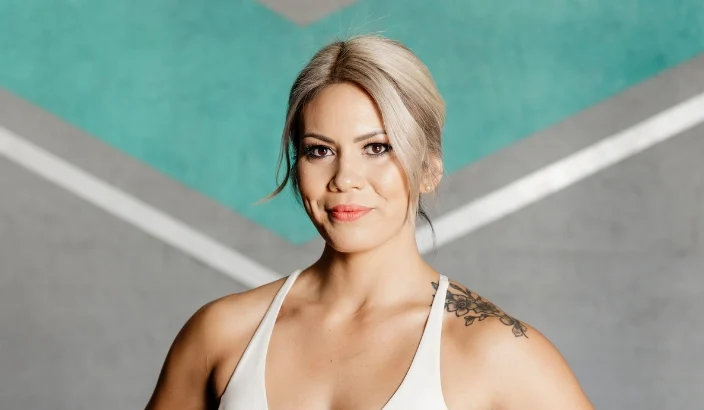Second chance strength

Lisa’s journey has been anything but easy – but today, she’s standing strong.
Lisa Reid is the picture of health. She owns a growing business as a nutritionist in Nelson, and holds a second job as an embalmer, both of which she loves. When she’s not working, you’ll likely find her at CrossFit, where she trains hard to keep her body strong and in shape, and her mind sharp. But less than three years ago, Lisa was in the throes of a crippling methamphetamine addiction that nearly destroyed her.
Words: Catherine Milford | Photos: Tessa Claus
“I had a normal childhood – I was well loved, my family gave me everything they could. People assume I must have had a rough upbringing because of what happened, but it was the opposite,” explains Lisa, 29, who was born in Thailand, grew up in Napier, and then moved to Gore. “I was in what I thought was a settled, stable relationship, and was really into health and fitness. Everyone saw me as this clean, green, fit person who had it all.”
After studying psychology and nutrition at university, Lisa opened a nutrition business in Gore. “Things were going great. I had a solid work-life balance, two dogs, Opie and Donnie, that I adored, a successful business, and I’d started building a house. I was cruising.”
But when her relationship ended in March 2022, Lisa’s world took a dramatic turn. “I wasn’t much of a drinker, but after my partner and I split, I felt like my world was going to pieces. One Saturday I went to a party and got drunk, and when somebody offered me meth, I took it,” she admits shakily.
The next weekend, Lisa went out drinking and took meth again – and again the following weekend. And the one after that. Soon she started taking it when she wasn’t drinking, and before long, weekend ‘dabbling’ crept into the weekdays. “At first I’d take it in the evenings, but then I started having some before work, because I was getting hot and cold sweats. When it started to wear off at work I’d sneak out on breaks to take more as I’d have terrible brain fog if I didn’t. I didn’t feel normal unless I was on it.”
Things progressed alarmingly quickly, and in May, Lisa realised she’d taken meth every day for 10 days. “I told myself it was time to stop – but I couldn’t,” she says. “I know it was self-inflicted – nobody was holding a gun to my head telling me to take meth. And I certainly didn’t set out to become an addict. Nobody does. But it happened so fast – I felt like I blinked and suddenly I was addicted.”
Methamphetamine addiction happens frighteningly quickly, with many people becoming hooked after just one use. The drug stimulates the release of dopamine in the brain, causing people to feel elated, alert and confident, but as it wears off, depression and anxiety kick in. Under the influence of meth, it becomes very difficult to sleep, and users lose their appetite – all symptoms Lisa experienced soon after her first encounter with the drug.
Before long, meth ruled Lisa’s world, and she’d come up with any excuse she could think of at work to hide the problem. “There I was, telling other people how to look after their own health, while my own was declining really quickly. Some patients with mental health issues were being referred to me by medical professionals for nutrition help, but I just wasn’t functioning. I shouldn’t have been there.”
Within a couple of months, she spent $30,000 – her entire life savings – on the drug. When that ran out, she started taking out loans, to the tune of another $30,000. And when she couldn’t get any more loans, she started taking out loans in her parents’ names, without their knowledge. “I was stealing money from my parents’ bank accounts, and still getting a wage from my job, but I wasn’t paying any bills – all that money was going on getting my next hit,” she says.
In the grip of a full-blown meth addiction, Lisa cut herself off from her normal world, and abandoned the health, fitness and nutrition she loved so much. “I was often a no-show at work, and I secluded myself away from family and friends,” she reveals. “My parents knew something was going on as we’d always been very close – I used to visit them every day, and I stopped seeing them altogether.”
Surrounded instead by drug dealers and other addicts, Lisa lost custody of her beloved dogs as she could no longer care for them. “My whole life revolved around Opie and Donnie, so losing them was like losing my children, but I couldn’t look after them, so one day I just took them up with me to my parents’ house and never went back for them because I knew they’d be better off there,” she recalls. “At home all I did was take meth. I didn’t sleep or eat – at one point I didn’t sleep at all for a whole week, which made me hallucinate, and I didn’t eat for five days. I’d fill in the time by drawing, or cleaning the house.”
Lisa describes herself at that time as “a dead person walking”. “I was a completely different person – it’s hard to recognise that version of myself now. Taking meth made me feel numb, then it would start to wear off and reality would creep in, so I’d take more meth to take the pain away.”
That June, her beloved grandfather passed away – and to her shame, she didn’t acknowledge the moment at all. “It was my mum’s dad, and I didn’t go to see her, or even go to his funeral,” she says sadly. “I was too busy being an addict.”
That August, Lisa moved into the house she’d built. “A friend asked me if I was at all excited about moving into my new build, and I remember thinking, ‘no, but I know I should be’,” she recalls.
In November, she was fired from her job. “I’d had a few warnings, and I’d confided in a co-worker, who was a former alcoholic, and they told management I had a problem.” Lisa was asked to do a drug test but refused, figuring she’d rather lose her job for refusing the test than produce a positive result.
With a mortgage and bills to pay but no income, Lisa pawned anything she could get her hands on. “I racked up thousands of dollars’ worth of debt, and I had drug dealers chasing me down for money I owed them,” she recalls. “I was living in a world where guns and knives were pulled; one guy even tried to overdose me on fentanyl. I’d lived such a sheltered life, so being exposed to this world was very, very scary.”
In January 2023, Lisa sold the last item of value she owned – her car – and smoked $5,000 worth of methamphetamine in a month. She’d finally hit rock bottom.
“I remember sitting on my bedroom floor in tears, looking around at this beautiful house I’d had built, and thinking – how did I get here? This isn’t how my life should be. I found myself thinking about what it felt like to touch my little dog’s fluffy heads, or sit at the dinner table with Mum and Dad. I couldn’t even do little things like go to the shops and buy a bottle of fizzy.
“I’d burned every bridge; by now, even the drug dealers didn’t want anything to do with me. I was out of ways to get meth, and the only way forward was to sell myself, but I’d rather have died than done that.” So at 3am on February 8, Lisa made an immensely courageous decision – she was quitting meth.
But the hard part was just beginning. The withdrawal process was brutal, and Lisa spent a week in bed with hot and cold sweats, shaking uncontrollably and suffering what she describes as the worst flu symptoms she’d ever experienced. Her body craved meth, which she managed by eating lollies – sometimes in her sleep. “I’d keep the bag under my pillow, and put one in my mouth while half-awake and go back to sleep.
“I didn’t shower for days. I’d get up, go to the toilet, throw up and go back to bed,” she tells. “Day five was the worst. I wanted to die that day.” Lisa’s new partner called her father, who comforted her and stayed with her that night, and the next day, she had her first shower in days. “That was a big step – it felt so good to do something as normal as shower,” she explains.
Just over a week after quitting, Lisa got a job in a shearing shed. “I worked there for six weeks, and it was incredibly physically hard, but it was lifesaving. It gave me a reason to get up in the morning, and I’d be so tired after, I’d go straight to sleep.” She used her first two pay cheques to buy back the items she’d pawned.
Lisa was on a slow but steady road to recovery – until March 30, when her partner had a workplace accident. “He was helicoptered to Dunedin in a critical state, and the reality of everything hit me like a ton of bricks. That was the darkest time of my life,” she recalls, her hands visibly shaking. “I gained 20kg, I felt trapped in my house and I hated going out in public. I was financially crippled, I couldn’t afford to eat properly, I was mentally very unwell and spiraling into a deep depression. I felt more stuck than when I was in active addiction – it felt like everything was against me and I had every reason to relapse.”
Unable to see a way forward, Lisa relied on unhealthy food and prescription medication to put her to sleep. “I didn’t want to be awake, to deal with the reality of the damage I’d caused as it made me hate myself.”
Lisa spent six months helping her partner recover from his injury, but she knew life in Gore was over for her, and in October the pair moved to Nelson. “In Gore, everybody knew what had happened – I couldn’t move on if I stayed. Coming to Nelson was a no-brainer.”
Once here, Lisa found work, went for long walks, joined CrossFit and began eating well again. “I was starting from square one – but it was a fresh start. Nobody was looking at me and judging me,” she says, smiling cautiously for the first time. “My health, and feeling like myself again, became my number one priority.”

Almost two years later, Lisa’s courage and determination has paid off, and she is stronger, fitter and healthier than ever. She has mended many relationships with friends and family, and Opie and Donnie are back with her. She’s paid off over $50,000 of the debts she accrued, and she’s learned to be an embalmer – a job she really enjoys, although she admits it can be brutal at times; a part of her feels that helping the deceased look good for their families is a way of giving back.
When she’s not working, she’s started travelling again – this year she went to Rarotonga, and later this year she’ll travel to Bali and Perth. She’s building up her nutrition business again, and she’s passionate about CrossFit, which she believes saved her life.
“I’ve learned that money can always be made, things can be replaced, but your health matters most,” she says. “CrossFit has been a huge part of my recovery journey as it gave me purpose and something to work towards.”
Lisa is also documenting her journey on Instagram in the hope that she can help others who are struggling. “I don’t think I’ll ever forgive myself for the damage I’ve done, and I think it’ll take a while to come to terms with the emotional harm I’ve caused,” she says quietly. “I’m nervous about telling my story in case I’m judged again, but I’m no longer ashamed of what I went through. I just want to do my bit to break the stigma of addiction, give hope to others who are struggling and to show people that there is always a way forward.

“I’m here to prove that even when it feels impossible, you can rebuild. I am forever grateful that I’ve been given a second chance at life, and I want to share that with anyone who needs it.”
Follow Lisa on Instagram @lisareidnutrition
For more information and help on addiction for you or someone you’re concerned about, visit info.health.nz
